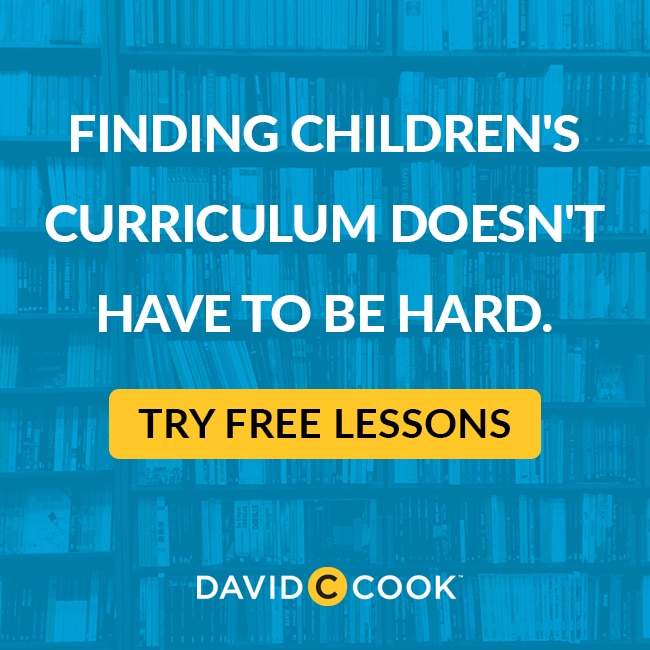It’s time. You need a new curriculum for your ministry.
Deep breath.
Because time is the key word, right? In the day to day of ministry, it can feel like we’re already limited on things like time, resources, and energy. So how can we simplify the process of something so vital to our ministry … especially in a day like today? Is it possible to take the stress out of finding curriculum?
The answer is yes. Yes, it’s possible to simplify your search. It’s possible to reduce the stress of finding the right resources for your children, families, and volunteers.
You have a Shepherd too. He knows you, sees you, and has the ability to guide you. Begin by asking Him for help. Invite Him into the process.
Let’s look at a few practical tips to get you moving toward a new curriculum.
LOOK BEYOND YOURSELF
Perhaps the reason that finding the right curriculum feels so weighty is because you value the spiritual needs of the people you serve and shepherd.
This is a good thing!
In fact, you can embrace this aspect. But remember that it doesn’t all rest on you.
You have a Shepherd too. He knows you, sees you, and has the ability to guide you. Begin by asking Him for help. Invite Him into the process.
LOOK FOR TRUTH

Before Jesus ascended, He told His followers to “go and make disciples” and to teach them to obey His commands (Matthew 28:18-20). Indeed, that is the goal of the church everywhere. So, the goal within our ministries is to make disciples.
What are disciples? Disciples are followers of Jesus.
Followers of Jesus know the truth of His Word. Once disciples know the Word, they can trust Him and obey His Word. This leads us to look for curriculum focused and built on God’s Word—the Bible. You will want:
- Lessons that teach the truth of God’s Word, not just morals or character
- Exercises that provide knowledge of the Word (opening the Bible, memorization, reading Scripture together)
- Lessons that present the good news that Jesus died for us and rose again
- Lessons that make God the main point of the Bible, not any one person in the Scripture
Key words to look for: Biblical, Scriptural, Gospel, Evangelism, Discipleship
LOOK FOR LOGISTICS
In addition to the foundation of the Bible, it’s likely you will have some specific needs to fulfill for your ministry. Some of those details might include:
- Preparation time for volunteers
- Age-appropriateness
- Supplemental pieces (videos, music, student pages, etc.)
- Engaging activities
- Weekly time allotment
- Parent pieces
- Fitting the philosophy of your local church
- Price
- Digital options (especially now)
This will vary for every ministry. So, start by making a list to prioritize your most important needs.
Next, enlist key volunteers and parents to provide feedback. Think about creating or using a rubric with numerical ratings for each item on your list. Some publishing companies also offer curriculum finders that seek to provide for some of the details listed above.
LOOK IN ALL THE RIGHT PLACES

It’s common for any of us to begin looking for information through a general internet search. This might be your “big break” to find the right fit . . . or it might make you feel like you’re about to break from all the choices!
Instead, consider beginning on a relational level. Contact a few other children’s or family ministers in your area or in your denomination. Ask what they use for lessons and why.
Attend online conferences and events. Many curriculum companies attend or host these key opportunities for connection. You could even attend a webinar!
Look at curriculum comparison charts, checklists, or catalogs. This one from Disciplr compares lots of different curriculum lines!
FINDING YOUR FIT
Now that you’ve done your research via personal conversations, general descriptions, and charts, it’s time to take a closer look at some lessons. The good news is that usually means FREE resources for you!
Free lesson samples are often downloadable. Look for them on a company’s website or contact the organization directly to get them in your hands. You can print them, mark them up, share them with your key volunteers and parents, and use them for a limited time in a classroom setting.
A good time to try the lessons in a live setting is in the summer, during holidays, or if your church is doing a short-term series.
FEEDBACK ON FIT
Be honest with your ministry staff and volunteers. Let them know you are trying something new. Get their feedback during the trial. Let them know it’s okay if these lessons don’t work out.
When a ministry plan doesn’t work out, it can often leave us feeling like failures.
But the Holy Spirit is not bound or broken by a curriculum that doesn’t fit. He transcends our plans and strategies. Keep remembering that the weight is not fully on you, even this far into the process.
FOLLOWING YOUR FIT
Once you find a curriculum that fits your needs and you have it in your hand, you’ve taken a big step—an exciting step!
Invite leaders, parents, and any other important individuals in your life to pray for your launch. Gather your children’s ministry team to pray together for each other, the children, and the families. Yes, even if that still means gathering online.
If you chose the curriculum based on a recommendation from another children’s minister, follow-up with that person to see if they have any hints for using the lessons at the beginning stages and beyond.
The Holy Spirit is not bound or broken by a curriculum that doesn’t fit. He transcends our plans and strategies. Keep remembering that the weight is not fully on you, even this far into the process.
FUN, FUN, FUN
Remember that deep breath you took when you realized you needed to look for new curriculum? It’s okay to exhale. In fact, it’s a good time to celebrate!
Put up a few streamers in your office. Buy your favorite cake to share with your ministry team. Turn on some of that worship music you might have acquired with your new curriculum purchase. Sing and dance along.
God is doing something new. And you get to be part of it. You can trust Him for all the days ahead.
“He has given me a new song to sing, a hymn of praise to our God. Many will see what he has done and be amazed. They will put their trust in the Lord.” Psalm 40:3 (NLT)
*Special thanks to the following ministry individuals for their contributions in shaping this article: Joel Smith, Dawn Heckert, Cathi Phillips, Tina Opdahl
Your heart beats for kids to know, love, and follow Jesus. And ours does too. Try any or all of our programs and lessons before you commit to buying. Check them out here.
Your heart beats for kids to know, love, and follow Jesus. And ours does too. Try any or all of our programs and lessons before you commit to buying. Check them out here.













